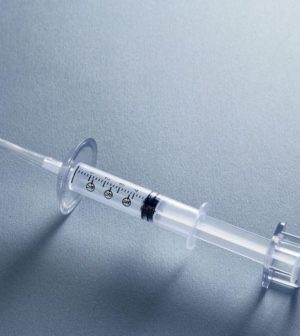- Recognizing the Signs of Hypothyroidism
- 10 Strategies to Overcome Insomnia
- Could Artificial Sweeteners Be Aging the Brain Faster?
- Techniques for Soothing Your Nervous System
- Does the Water in Your House Smell Funny? Here’s Why
- Can a Daily Dose of Apple Cider Vinegar Actually Aid Weight Loss?
- 6 Health Beverages That Can Actually Spike Your Blood Sugar
- Treatment Options for Social Anxiety Disorder
- Understanding the Connection Between Anxiety and Depression
- How Daily Prunes Can Influence Cholesterol and Inflammation
Study Suggests COVID Vaccine Booster Shots Will Be Needed

One dose of a two-dose mRNA COVID-19 vaccine is enough to protect previously infected people, but it’s likely they and everyone with two doses will still require booster shots at a later date, a new study suggests.
That’s because antibodies triggered through either natural infection or vaccines decline at about the same rate, the University of California, Los Angeles researchers explained.
“Our data suggest that a person who previously had COVID-19 has a huge response after the first mRNA vaccination and has little or no benefit from the second dose,” said senior author Dr. Otto Yang, a professor of medicine in the Division of Infectious Diseases, and of microbiology, immunology and molecular genetics.
“It is worth considering changing public health policy to take this into account both to maximize vaccine usage and avoid unnecessary side effects,” Yang said in a UCLA news release.
The two-dose Pfizer and Moderna vaccines trigger the immune system to produce antibodies against SARS-CoV-2, the virus that causes COVID-19.
Clinical trials showed that two doses of either vaccine provide about 95% protection against the virus, but the trials included few people who’d already been infected. Also, it wasn’t clear how quickly antibody levels and strength declined.
To find out, the UCLA team measured antibodies in 28 people who’d never been infected and in 36 people soon after they recovered from mild or severe COVID-19.
In those who’d never been infected, one dose of either vaccine produced antibody levels similar to those in people who’d had mild COVID-19, and two doses resulted in levels similar to those in people who’d had severe COVID-19.
In people who had COVID-19 prior to vaccination, the first dose produced a strong antibody response similar to severe natural infection, but the second dose provided no additional increase in antibody levels.
The effectiveness of antibodies followed similar patterns, according to the study published June 23 in the journal ACS Nano.
It also found that after the second vaccine dose, declines in antibody levels in both groups were similar to what occurs after a natural infection, with an average loss of 90% within 85 days.
More research is needed, but these findings indicate that all vaccinated people will likely require booster shots, the study authors said.
More information
The U.S. Centers for Disease Control and Prevention has more on COVID-19 vaccines.
SOURCE: University of California, Los Angeles, news release, June 23, 2021
Source: HealthDay
Copyright © 2026 HealthDay. All rights reserved.










